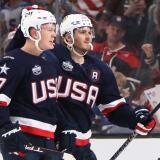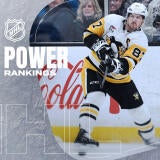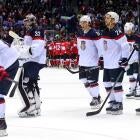
Penguins enter important offseason with many big questions
Pittsburgh Penguins general manager Ray Shero has some decisions to make this offseason. They start with Dan Bylsma and Marc-Andre Fleury.

More NHL Playoffs: Scores | TV Schedule | Expert Picks | Odds | Mock Draft | Rumors
It's probably safe to say that the Eastern Conference finals did not go entirely as planned for the Pittsburgh Penguins.
Not only were they eliminated by the Boston Bruins, they failed to win even one game and were held to just two goals by a suffocating defense, not to mention a white-hot goalie (Tuukka Rask) that was seeing -- and stopping -- just about everything fired at him. When a team goes out in the playoffs in such a disappointing way it's easy to start looking at what changes need to be made, what changes should be made, and what changes will be made.
Teams also have to be careful to not make a kneejerk decision as they can get themselves into a lot of trouble when they overreact based on the small sample size of a playoff run. Or the even smaller sample size of a single playoff series. It can be a matter of signing a guy for too much money because he got hot at the right time, or just as worse, dumping a player because he hit a cold streak or played poorly for a stretch at the wrong time.
Or making major coaching and philosophical changes to the team, the way it's constructed, and the way it plays.
This Penguins team, even after its four-game sweep and offensive power outage at the hands of the Bruins, isn't in need of a massive overhaul. They've scored more goals (by far) than any other team in the NHL over the past two years and one clunker of a four-game series against Boston should not overshadow that. A lot of it was simply getting outplayed by one of the best goalies in the NHL playing some of the best hockey of his career. Some of it was a run of bad shooting luck by hitting the post no fewer than 10 times over the course of the series. Sometimes that happens and there's nothing any player or coach can do about it. When it happens in January nobody cares because it's forgotten about two weeks later. When it happens in May or June, well, it probably results in the end of your season so it's fresh in everybody's minds for the next three months.
But that doesn't mean the Pittsburgh front office doesn't have some big decisions to make this summer and some important questions to answer.
Coach Dan Bylsma seems to be in the crosshairs right now which is pretty understandable, only because the coach is the easiest change to make. But his resume with the Penguins is an impressive one as he owns a 201-92-25 record in the regular season and was behind the bench for a Stanley Cup win.
Since that Stanley Cup however, which came back in 2009, the Penguins have won just three postseason series, with two of them coming this year. They have been eliminated by a lower-seeded team in every postseason since.
The criticism is that with the talent he's had on his roster there should be more to show for it.
Maybe that's true. But it's also true that winning the Stanley Cup is incredibly hard and not only requires a tremendous amount of skill, but also quite a bit of luck. The only thing harder than making all of that come together at the exact same time once is making it all happen a second time. I know this is true because the list of current coaches in the NHL to have their name on the Stanley Cup more than once has, at the moment, zero names on it.
If Bylsma were made available, he wouldn't have to wait long for another head coaching job in the NHL.
That's not to say he is above criticism and didn't make mistakes along the way (and won't make mistakes in the future). In fact, both he and general manager Ray Shero, as well as the front office as a whole, made moves this season that need to be questioned.
For Shero, it was the trade deadline additions of Brenden Morrow and Douglas Murray, a series of moves that did nothing but make the team older and slower. There is also the fact the Penguins never addressed their biggest glaring weakness this season, which was finding another top-four defenseman. The latter was a hole they helped to create for themselves over the summer when they dealt Zbynek Michalek back to the Phoenix Coyotes for what amounted to nothing. He helped form a tremendous shutdown pairing for the Coyotes playing alongside Oliver-Ekman Larsson.
For Bylsma, a lot of it is about personnel decisions and not trusting his young players like Beau Bennett and Simon Despres. As the Penguins defense struggled throughout the postseason he continued to rotate try-hard veterans like Deryk Engelland and Mark Eaton in and out of the lineup, both of whom were interchangeable with how poorly they played. Along with that, he refused to play Despres, a young puck-moving defenseman that could have given the Penguins a dimension they severely lacked on their blue line. Unless Despres was dealing with an injury that hasn't been disclosed there's really no excuse for allowing that to happen.
The same can be said for not giving Bennett more of a look, especially when he was never out of place in any role after being called up from the American Hockey League late in the season and was one of their better forwards once they inserted him into the lineup in Games 3 and 4 against the Bruins.
What makes that useage even more baffling was Bylsma's comment on Sunday that he expects Bennett to be a top-six forward and Despres a top-four defenseman next season, roles they should have probably already been playing in. If they're good enough to play that sort of a role four months from now, why weren't they good enough a week ago? Especially when veterans like Engelland, Eaton, Morrow, and Jarome Iginla were struggling so much.
Are these mistakes enough to cost a coach his job? They're costly, but they can be corrected, especially if he actually follows through with giving the younger guys meaningful roles next season. A report surfaced from the New York Post over the weekend that owner Mario Lemieux could force a change but that seems to be more speculation (or just flat out wrong) than reality. I don't think a change is coming and I'd expect that when the 2013-14 season begins it will in fact be Bylsma behind Pittsburgh's bench.
But the coach isn't the only major decision that the front office may have to make this summer.
And the line combinations and defense pairings aren't the only spot the coaching staff has to worry about.
1) What to do with Marc-Andre Fleury?
To hear Bylsma talk, Marc-Andre Fleury will continue to be the Penguins' No. 1 goalie next season.
"Marc-Andre Fleury is a guy who's going to come back to our team, and he's going to be the No. 1 goalie," Bylsma said on Sunday. "He's going to be our franchise goalie. He's going to be this franchise's goalie."
Based on the way the goaltending situation played out in Pittsburgh this postseason (and the three postseasons prior to this one) it's more than a little hard to fathom how that is even possible.
Tomas Vokoun took the starting job away from Fleury midway through the first round against the New York Islanders and not only never looked back -- not even after his worst start of the postseason in Game 2 of the Eastern Conference final -- but may have also been the single biggest reason the Penguins made it as far as they did. To easily toss that aside and dismiss the possibility of him being the starter in 2013-14 (when he's still under contract for $2 million against the salary cap) is more than a little bizarre.
It's not like Vokoun is just some guy that came out of nowhere without a track record. Vokoun has been one of the best goalies in the NHL for nearly a decade and even at 36 has shown he's still capable of playing at a high level.
Those are obviously strong words from Bylsma when it comes to the position, but the bigger question that remains is whether or not the front office agrees and will still keep Fleury on the roster. Bylsma can plan on starting him (or say he's going to start him) all he wants, but if the front office decides to go in a different direction, well, that pretty much makes the decision for the coach an easy one.
The Penguins have a couple of new contracts to work out this summer (more on that in a minute) and cap space could be an issue over the next two years. Fleury is scheduled to count $5 million against the cap in each of the next two seasons and the front office has to seriously ask itself if that's the best possible use of that cap space.
Even with Bylsma's strong support of Fleury on Sunday there's enough evidence to suggest there may in fact be some sort of confidence issue when it comes to the front office. They'll never admit it publically, but if the Penguins were fully satisfied with his play before this season then why was their very first move last summer to go out and acquire an established goalie like Vokoun (again, one of the best in the NHL) and then give a two-year, $4 million contract?
That makes him the highest paid "backup" in the NHL. It's more than a few starters make. And despite what you might hear, that's not a contract you pay a player to simply "give your starter a break during" the regular season. That's a contract you give to a guy that could end up being your starter at some point. It's an opportunity that Vokoun may have in fact earned.
Moreover, what sort of accountability is there if you go back to Fleury after his fourth straight sub-par postseason performance and after Vokoun did everything that was asked of him (and more)? If that's the way it plays out, it's almost as if performance doesn't really matter.
Looking at their careers head-to-head Vokoun has posted better numbers (save percentage, even-strength save percentage) almost every year since 2005. I know Fleury has the Stanley Cup ring in his corner, but let's face it, four years ago is an eternity in the world of professional sports.
Trading him wouldn't be easy, not necessarily due to his ability or even his production, but if for no other reason than there aren't a ton of teams in the market for a new starting goalie. And there might be equal (or better) options available in free agency (Mike Smith, Niklas Backstrom, maybe Anton Khudobin) that wouldn't require a team to give up assets if it's looking for a new starter.
If nothing else, the Penguins should at least strongly be considering the possibility of using one of their two amnesty buyouts on Fleury. It's difficult to pay a player to play for somebody else, but the Penguins need the cap space and already have a capable replacement (at least for the short-term) on the roster.
Committing $10 million in cap space over the next two years to a goalie that wasn't considered good enough to start the majority of your playoff games may not be the best use of a team's resources. Especially when there's a better goalie already on the roster. And especially when you're operating in a salary cap league and have some other key players that need to be paid.
2) Evgeni Malkin and Kris Letang
And now we get into the core. Perhaps no series of decisions will define Shero's career in Pittsburgh more than what he does with two of his best players, forward Evgeni Malkin and defenseman Kris Letang.
Both players are entering the final year of their contracts and can officially be re-signed to new contract extensions starting this summer. Is it possible to keep both? Maybe, but it could be difficult. If it comes down to an either/or situation, you have to keep Malkin.
Every offseason there is always a series of columns or speculation that the Penguins should consider trading Malkin for any number of reasons.
Heck, this year it started even before the Penguins were eliminated.
If Pens lose series in 4 or 5 games the offseason storylines may beinteresting. Some think Malkin becomes a trade target. Tough call.
— Darren Dreger (@DarrenDreger) June 6, 2013
Actually, it's an easy call.
Malkin is a generational talent and one of the two or three best players in the NHL. Players like him don't come along very often, and when you get them, you have to do whatever you can to keep them for as long as you can. At least through the prime of their career, which Malkin is currently in. Like every other Penguin he was shutdown against Boston, but he was consistently Pittsburgh's most dangerous forward in the series and constantly creating chances. He's a must keep, and it sounds like the two sides will start talking very, very shortly.
Re-signing Malkin is the easy the decision.
When you get to Letang things get a little more difficult. He is by far Pittsburgh's most talented defenseman, and one of the best in the league. He's going to command -- and get -- a ton of money from somebody at some point over the next two years.
He's also coming off of a brutal series against Boston and an up-and-down postseason (remember what I said earlier about making bad decisions based on the small sample size of a playoff series? Keep that in mind when it comes to Letang).
The Penguins have been stockpiling young defenseman for years and currently boast one of the best prospect pools in the league at the position. But some of them are still a year or two away (or more) from really being able to make an impact in the NHL. The one they do have on the NHL roster (Despres) doesn't yet seem to have the trust of the coaching staff. The Penguins defense is already a weak spot and without Letang would basically be limited to Paul Martin, whatever is left of Brooks Orpik, and a bunch of question marks. The Free agent market for defensemen this summer is a barren wasteland, made worse by the fact 39-year-old players well past their prime are getting $10 million over two years.
They may not be able to afford him financially under the salary cap in the future, but they also can't afford to lose him.
At least not this summer.
Really, it's the exact same situation they faced with Jordan Staal last summer: A core player with one year remaining before he's eligible for unrestricted free agency. They ended up trading Staal on draft day. Don't count on the same result here.
3) The Free Agents
As for the players that are eligible for free agency this summer, the Penguins have seven players that can hit the open market on July 5: Pascal Dupuis, Matt Cooke, Jarome Iginla, Brenden Morrow, Craig Adams, Douglas Murray, and Mark Eaton.
Dupuis and Cooke are the two that should the top priorities, and it seems that no one will be a bigger priority than Dupuis. And for good reason. He's been one of the most productive players in the NHL at even-strength over the past two seasons, still has great speed, is a solid defensive player, and one of their top penalty killers. In a weak free agent class he could probably cash-in on the open market (and this is probably his last chance to do that) but he also seems to have strong emotional ties to the Penguins. He's taken bargain contracts with the team before. The question is whether or not he's willing to do that again when some team with more cap space could step up with a bigger offer.
Cooke has his critics, but he's also a heck of a third liner and penalty killer and still brings plenty of value.
The other free agents just don't seem to have much left in the tank.
That's a lot for general manager Ray Shero to handle this offseason, and even though his team needs a move here and there and they have a lot of big decisions to make, it's not a team that needs to be completely rebuilt.

















